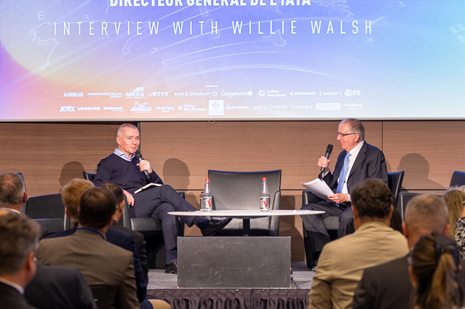
On June 7, the Paris Air Forum brought together around 250,000 participants from both the aviation and aerospace industries around the theme of “Rekindling the thrill of progress”. Some highlights from IATA’s Director General’s on-site remarks:
Restart
We are witnessing bottlenecks and capacity issues in many airports, including in the UK, Dublin or Amsterdam. These challenges are not new to the industry, which will once more have to deal with them. These represent no real concern in the long run, and we should remind ourselves that we are in a better place than we were at the same time last year.
Restrictions
There is significant disparity among regions. Asia continues to lag behind with a huge market such as China which remains mostly closed. The situation is starting to ease despite the zero-covid policy pursued by the authorities.
However, studies show that restrictions have little to no effect on stopping the virus. In best cases, they can contribute to delay its spread by a few days. In fact, the World Health Organization (WHO) never recommended closing borders to control the pandemic. The closures were politically motivated.
Harmonization of measures
The harmonization of measures is critical for aviation. We witnessed this necessity throughout the entire pandemic. Today, passengers still have to experience inconsistencies, or illogical measures among which the requirement to wear masks onboard a flight only at departure or upon arrival, depending on the local regulatory obligations.
A peak into the future
We are seeing an important pent-up demand for air travel, and we are optimistic this will continue beyond the summer peak and into next year, when certain markets can achieve pre-Covid levels recovery.
Uncertainty linked to the war in Ukraine and its impact, particularly on oil prices, must be taken into account. If we follow past trends, airlines will be passing this cost increase to passengers, particularly with their heavily affected balance sheets and covid-induced debt.
Technology and digital solutions must be embraced, but in-person travel remains essential, as growing business class travel suggests.
Environment - Sustainable Aviation Fuels (SAF)
This issue must be addressed urgently. Net zero was adopted at the Annual General Meeting (IATA AGM) last year, and though the industry recognizes its criticality, implementing it will be no easy task, especially due to costs and the absence of solutions. 80% of CO2 emissions are linked to Long Haul Travel, where we expect no technological solution to become available in the near to medium term. SAF, our best alternative, still cost around 2.7 times more than regular jet fuel. The industry bought every single drop of SAF available. We need suppliers such as the traditional oil companies to produce it and be part of the solution by investing more. The demand exists, we need the supply to match it. The United States government has decided to incentivize SAF, and governments elsewhere should provide the same financial support as they have done for road transport fuel.
Environment – Single European Sky (SES2+)
The Single European Sky (SES2+) initiative could represent a reduction in CO2 comprised between 10 and 12%. SES is a clear example of a political scandal. Trains cannot always replace planes. The infrastructure costs, noise impact, are among the reasons we should not blindly opt for the former over the latter. According to a Eurocontrol report, by removing all 500 kilometers or less flights -and assuming a rail alternative already exists-, you would reduce the number of flights by 24% but CO2 emissions by just 3.8%. By walking the walk as well as the talk and actively pushing for the SES2+, politicians could help reduce CO2 emissions by 12%.
You can watch the full-length interview below (from 5:25:00 to 6:21:20):
Additional Information: